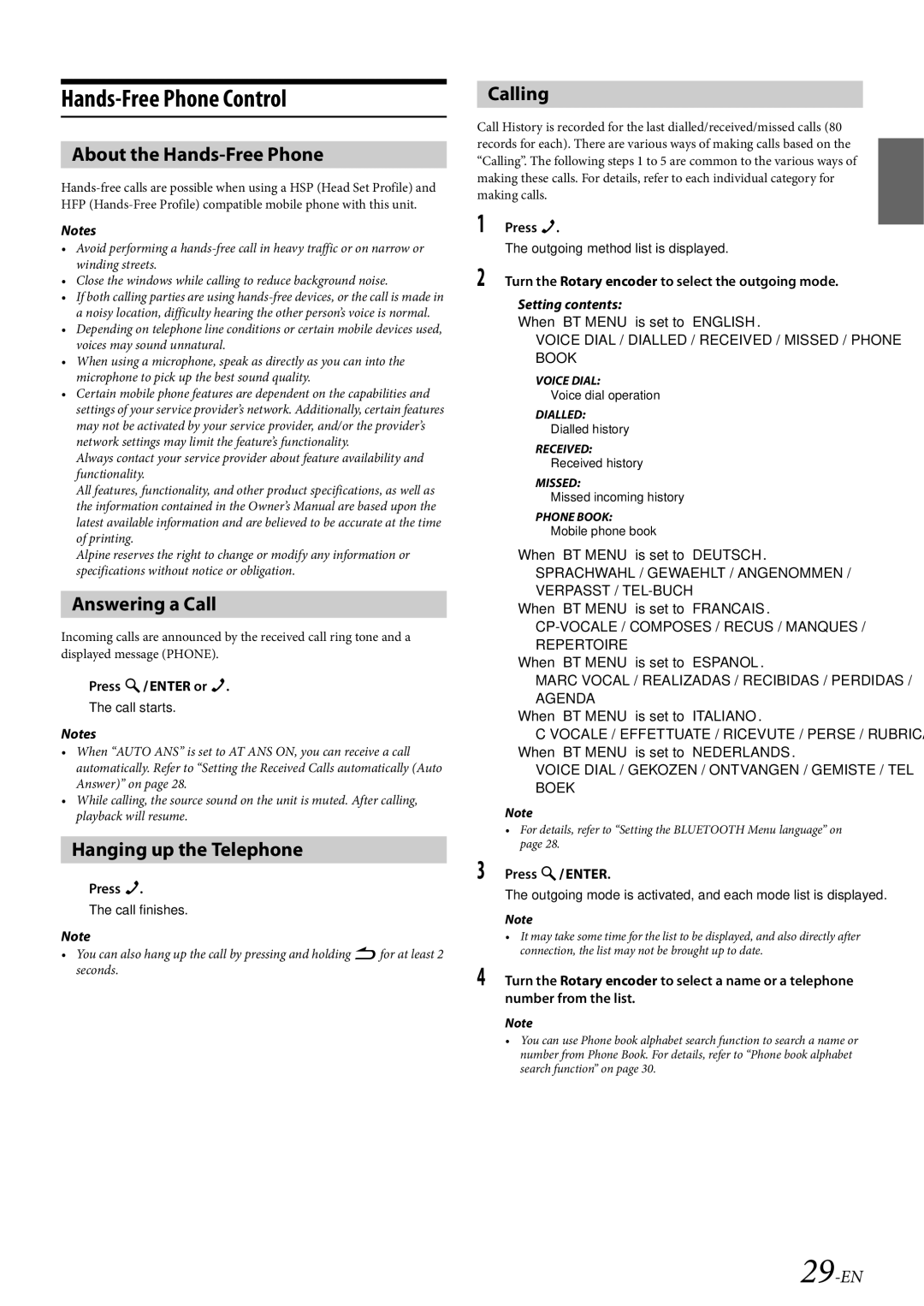
Hands-Free Phone Control
About the Hands-Free Phone
Notes
•Avoid performing a
•Close the windows while calling to reduce background noise.
•If both calling parties are using
•Depending on telephone line conditions or certain mobile devices used, voices may sound unnatural.
•When using a microphone, speak as directly as you can into the microphone to pick up the best sound quality.
•Certain mobile phone features are dependent on the capabilities and settings of your service provider’s network. Additionally, certain features may not be activated by your service provider, and/or the provider’s network settings may limit the feature’s functionality.
Always contact your service provider about feature availability and functionality.
All features, functionality, and other product specifications, as well as the information contained in the Owner’s Manual are based upon the latest available information and are believed to be accurate at the time of printing.
Alpine reserves the right to change or modify any information or specifications without notice or obligation.
Answering a Call
Incoming calls are announced by the received call ring tone and a displayed message (PHONE).
Press ENTER or f.
The call starts.
Notes
•When “AUTO ANS” is set to AT ANS ON, you can receive a call automatically. Refer to “Setting the Received Calls automatically (Auto Answer)” on page 28.
•While calling, the source sound on the unit is muted. After calling, playback will resume.
Hanging up the Telephone
Press f.
The call finishes.
Note
•You can also hang up the call by pressing and holding for at least 2 seconds.
Calling
Call History is recorded for the last dialled/received/missed calls (80 records for each). There are various ways of making calls based on the “Calling”. The following steps 1 to 5 are common to the various ways of making these calls. For details, refer to each individual category for making calls.
1Press f.
The outgoing method list is displayed.
2Turn the Rotary encoder to select the outgoing mode.
Setting contents:
When “BT MENU” is set to “ENGLISH”.
VOICE DIAL / DIALLED / RECEIVED / MISSED / PHONE BOOK
VOICE DIAL:
Voice dial operation
DIALLED:
Dialled history
RECEIVED:
Received history
MISSED:
Missed incoming history
PHONE BOOK:
Mobile phone book
When “BT MENU” is set to “DEUTSCH”.
SPRACHWAHL / GEWAEHLT / ANGENOMMEN / VERPASST /
When “BT MENU” is set to “FRANCAIS”.
When “BT MENU” is set to “ESPANOL”.
MARC VOCAL / REALIZADAS / RECIBIDAS / PERDIDAS / AGENDA
When “BT MENU” is set to “ITALIANO”.
C VOCALE / EFFETTUATE / RICEVUTE / PERSE / RUBRICA When “BT MENU” is set to “NEDERLANDS”.
VOICE DIAL / GEKOZEN / ONTVANGEN / GEMISTE / TEL BOEK
Note
•For details, refer to “Setting the BLUETOOTH Menu language” on page 28.
3Press ENTER.
The outgoing mode is activated, and each mode list is displayed.
Note
•It may take some time for the list to be displayed, and also directly after connection, the list may not be brought up to date.
4Turn the Rotary encoder to select a name or a telephone number from the list.
Note
•You can use Phone book alphabet search function to search a name or number from Phone Book. For details, refer to “Phone book alphabet search function” on page 30.
